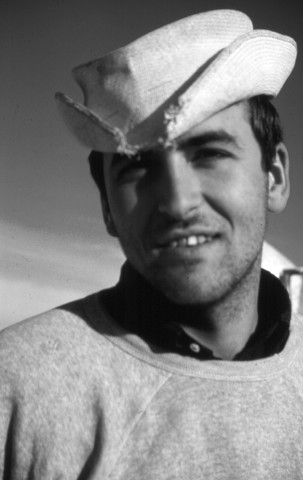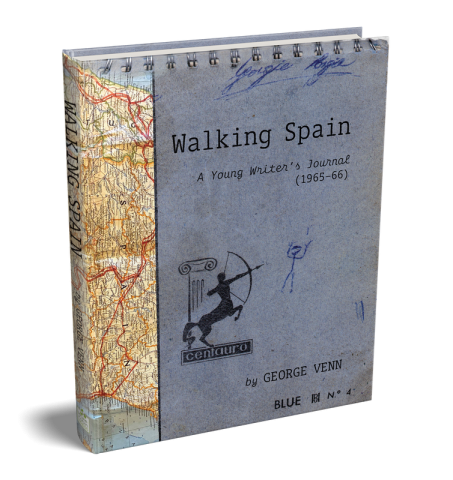
George Venn (1943) is an award-winning poet, writer, literary historian, editor, linguist and educator.
A distinguished figure in western American literature, George’s works include: Marking the Magic Circle; Off the Main Road; West of Paradise; Endless Pressure, Endlessly Applied; Soldier to Advocate; Darkroom Soldier; Lichen Songs; Walking Spain: A Young Writer’s Journal (1965–66), and more.
For his literary prowess, George has received numerous awards and accolades including a national Pushcart Prize, a silver medal from the Oregon Institute of Literary Arts, the Stewart Holbrook Award for outstanding contributions to Oregon’s literary life, an Oregon Book Award Finalist, and an International Book Excellence Award Winner. The Oregon Cultural Heritage Commission listed one of his books among the 100 best Oregon books in two centuries.
His poems and stories have been widely published in regional periodicals and anthologized in 17 different state, regional, and national collections. His work has been included in the national Poetry in Motion program, carved in stone at the New Oregon Zoo, and featured in film and concert performances. Recent performances have been staged in England and Sweden.
In his early life, George distinguished himself as a star athlete, lead actor, baritone soloist, tennis player, undergraduate editor, and international bilingual traveler to Ecuador, Spain, and later—China. Completing his MFA in Montana in 1970, he accepted an academic position at Eastern Oregon University. From 1970–2000, he taught, wrote, edited, championed, and published anthologies, fiction, poetry, translations, and prose—works by others as well as his own. He has consistently redefined 20th–21st century literature with his visionary work and influence.
The following one-on-one interview shares George’s background and experience writing Walking Spain: A Young Writer’s Journal (1965–66).
Tell us about Walking Spain: A Young Writer’s Journal (1965–66).
Walking Spain is a personal narrative collage from original texts simmering in my archive since 1965–66.
Escaping the wild northwest in the fall of 1965, I was a 21-year-old would-be writer who secretly set out alone on a 16,000-mile quest to discover Spain. Picaro, bilingual, baritone, junior English major, virgin, athlete, lover, I recorded my travels to Salamanca to study at that famous university. Eventually expelled, short funds, fired, seduced, I set out in winter 1966 to walk Spain.
This journal tells that uncensored story—pack, tent, wits, sleeping bag, and more. Along the way, I learned to embrace life on the road, to learn to write daily, to change, to live by my wits, and to love.
What inspired you to write Walking Spain: A Young Writer’s Journal (1965–66)?
Two forces inspired these 215 pages.
From 1963–1964, I lived, worked and studied in Quito, Ecuador. When the Central University was occupied by the Ecuadorian army, I was suddenly liberated from my typical academic routine. Living alone and free to make my own decisions, I continued to perfect my Spanish, teach English, coach basketball, sing on radio and TV, and send 3–4-page typed letters home. My delight in composing those letters forever grounded my view of myself as a writer. More recently in 2021, I underwent a nightmare hip replacement surgery and now live with Parkinson’s and Lewy Body disease. After months of therapy, rehab, grief, and loss, I revisited, re-lived, and transcribed this journal, framing the present rehabilitation with the healing stories from 60-odd years ago—a time I first enjoyed strength, hope, mobility, and love.
How did your background and experience influence your writing?
My broad understanding of the world began with travel for my grandfather’s apiary. My awareness expanded with high school teachers from Greece, the Philippines, Italy, and Cuba, and further expanded by college dormitory friends from Kenya, Japan, Argentina and Hawaii. Living with and befriending international students throughout my college years gave me an intensive awareness of other cultures, and the rich differences they might bring. They were my cultural and artistic champions, dramatically shaping my views of the possibilities in the world as it was—our shared and expanding universe—and helped define my early commitment to cultural diversity and inclusivity. Finishing my undergraduate requirements at The College of Idaho, I still didn’t have a major, so Spanish led me to Latin America for a year to live and work. That year changed everything as I became more bilingual, more international, more citizen of the world.
Later in Spain, my writing on the road gave shape to unexpurgated daily journal entries—loaded with brief episodes from day-by-day travels and encounters. Sharing these experiences drew me to non-fiction and memoir.
What is one message you would like readers to remember?
Writers say that traveling, sleeping, and falling in love are the same thing—three ways to go places we might never comprehend. So, get your passport, cross borders, fill a journal with stories, and when you come back, be changed.
Evolve. Live your new life. Discover. Go on again. Some bright morning be ready to fly away!

Purchasing the Book
Described by The Oregonian as “one of the best-known and most respected poets in the state,” George Venn is a literary champion whose memoir is not to be missed. Walking Spain: A Young Writer’s Journal (1965–66) is available for sale on Amazon, Barnes & Noble, and other online bookstores. Readers are encouraged to purchase their copy today: wakerobinpress.com/spain
Connect with George Venn:
George Venn Ars Poetica Reading, EOU 2013
George reads his poem, “The World According to Apples.”
Media Contact
Company Name: Author News Network
Contact Person: Media Relations
Email: Send Email
Country: United States
Website: authornewsnetwork.com
